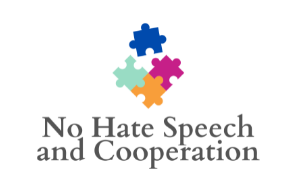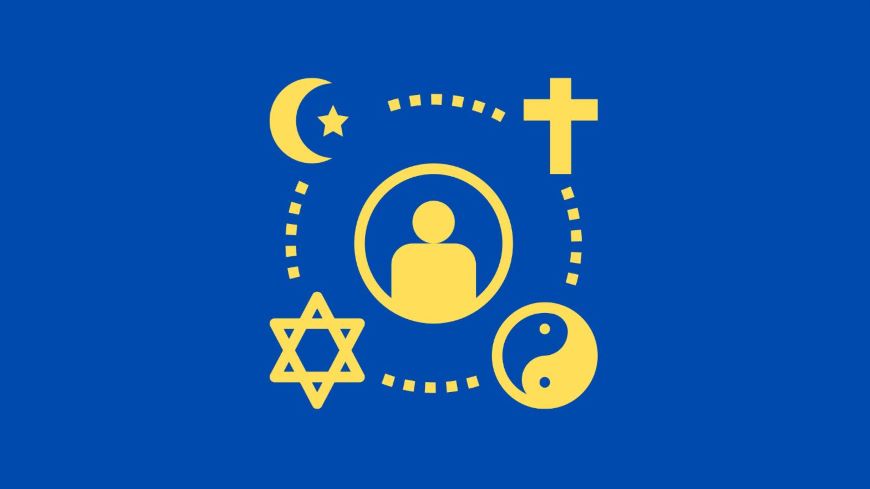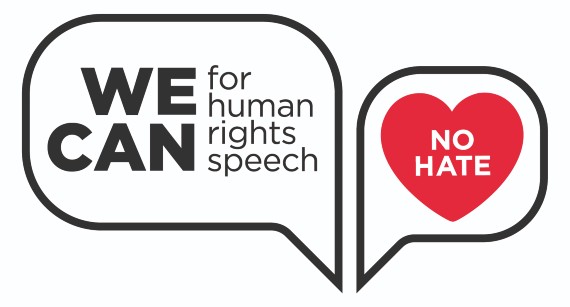Countering hate speech and prejudice
Hatred and prejudice, if allowed to flourish unchallenged, pose a danger to the respect of human dignity and freedom from discrimination of each individual, and ultimately to the cohesion of our societies. The Division’s work helps a number of stakeholders to address phenomena caused by hatred and prejudice, from rumours, stereotypes and intolerance to the most extreme consequences such as racism, discrimination, hate speech and hate crime.
Types of support we provide to combat hate speech and prejudice include:
Designing campaigns to counter hate speech
- The I choose equality campaign aims to raise awareness about human rights and anti-discrimination policy and their importance for securing democracy, peace and prosperity in Georgian society.
- The WE CAN for human rights speech project led thematic campaigns against anti-Roma, anti-Muslim and antisemitic hate speech across Europe
- The Block the hatred. Share the love campaign is running in countries across the Western Balkans and is supported and promoted by local ambassadors.
- The Intercultural Cities Programme runs joint campaigns with member cities to amplify the message of real equality, diversity advantage and intercultural interaction. The campaigns are based around international days such a Refugee Day and Migrants Day.

Building policies and strategies to counter hate speech
- We have carried out systemic analyses of national responses to hate speech and mapped how members of society are impacted by hate speech and the redress available to them. By breaking a system down into its component parts and studying how these parts work and interact to accomplish their purpose helps identify gaps, challenges and new actions and tools, following the analysis a range of interventions can be developed to improve the national response to hate speech.

Building anti-rumour strategies
The anti-rumours strategy is a long-term process of social change. It seeks to prevent discrimination, improve coexistence, and harness the potential of diversity by triggering a change in perceptions, attitudes, and behaviours among the general population and specific target groups. We have worked with Antirumours global to develop the anti-rumour methodology.
Understood as a public policy, the anti-rumours strategy is composed of a number of elements: identifying major rumours existing in a city; collecting objective data and also emotional arguments to dismantle false rumours; creating an anti-rumour network of local actors from civil society; empowering and training anti-rumour agents; and designing and implementing anti-rumour campaigns to raise awareness, including by creating and disseminating new tools and resources, both creative and rigorous.

Developing alternative narratives and inclusive communication
The Intercultural Cities Programme have produced learning materials and organised an intercultural integration academy focussing on alternative narratives and inclusive communication. Alternative narratives are positive, pluralist or progressive narratives that are based on respect for human rights and intercultural principles. While counter-narratives are reactive in nature, an alternative narrative will start more positively, pro-actively and independently from its own values and its own framework.

Cooperating with faith-based institutions to combat hate speech
To counter hate speech within religious communities targeting, among others LGBTI persons, we have developed a pilot capacity building project in 13 member states which provides tools to representatives of faith-based institutions to identify hate speech and its consequences and to improve communication that is mindful and inclusive.
 Training courses
Training courses

Anti-rumours methodology online training course
The Intercultural Cities Programme prepared this online course on the anti-rumours methodology to provide more information on the theoretical approach and reformulates the objectives of the antirumours strategy and aspects of its methodology. The course can be useful both for cities that have been implementing the Antirumours strategy for years, and for those that have just started, or are planning to do so in the near future.
The nature of the methodology leaves significant room for each city to adapt it to its own context and specific circumstances, as well as decide its own priorities and objectives. Each implementation of the strategy opens new opportunities for collaboration with diverse actors, that in turn, adapt the antirumours approach to different areas and sectors.

Alternative narratives and inclusive communication online course
This Intercultural Cities Programme course on inclusive communication and alternative narratives is a starting point to build capacity for positive intercultural messaging and for the development of a public discourse to counter rumours, stereotypes and ultimately the spread of hate speech. This course is open only to member cites of the Intercultural Cities network.
Are you interested in taking the course? Please contact the Intercultural Cities secretariat for more information.
 Resources
Resources

Anti-rumours handbook and guides
This handbook presents a practical guide to the anti-rumours strategy, which is a long-term process of social change seeking to prevent discrimination, improve coexistence, and harness the potential of diversity by triggering a change in perceptions, attitudes, and behaviours among the general population and specific target groups.
- Anti-rumour handbook : a standardised methodology for cities (2018) (Arabic, French, Italian, Japanese, Spanish, Portuguese, Ukrainian)
This guide supports the anti-rumousr handbook in providing practical advice on the anti-rumours diagnosis which proceeds the anti-rumours strategy. The diagnosis helps identify the needs and priorities in the context of a city and is a continuous process over time.
This guide provides advice on working with young people on the anti-rumours methodology.

Policy briefs on alternative narratives for cities
This policy brief is based on research about the alternative narratives developed by cities in relation to migration and integration and aims to provide city officials with a practical guide to which alternative narratives work in the field of migration and integration and why they work.
- Migration and integration: Which alternative narratives work and why? - Policy Brief (2021) (French)
This policy brief is intended for city officials and offers a practical toolkit for anti-rumours dialogue. The toolkit is based on the anti-rumours methodology to fight rumours on a city level and focusses on useful strategies for conversations on dividing topics.
- Claiming the power of dialogue: Toolkit for antirumour dialogue - Policy Brief (2021) (French)
This policy brief directed to city officials is a practical guide to what alternative narratives are and how city officials can work create effective alternative narratives on diversity.
- 10 criteria for the creation of effective alternative narratives on diversity – Policy Brief (2019) (French, Italian, Spanish)
This short video introduces the topic of inclusive communication and offers an overview of how cities can work to ensure their communication becomes more inclusive and directed to the whole diverse population.
- Inclusive communication – Video (2021)
"Speak peace! Hate speech is not an option!"
"Speak peace! Hate speech is not an option!" is a brochure to learn the basic concepts of hate speech (January 2021)
English, Albanian, Armenian, Azerbaijani, Bosnian, Georgian, Macedonian, Montenegrin, Romanian, Russian, Serbian, Ukrainian

WECAN Toolkit for Human Rights speech
This set of online tools aims to support users to assess the severity of the hate speech incident in line with international standards and determine appropriate response; to define their human rights based narratives on a particular topic/issue; and to develop a communication strategy including specific tips for effectively using digital platform tools. The tools include quizzes, checklist and range of exercises ; they can be used individually or as part of group activities.
- We CAN 4 Human Rights Speech Toolkit (2021) (French German, Italian and Romanian soon)



